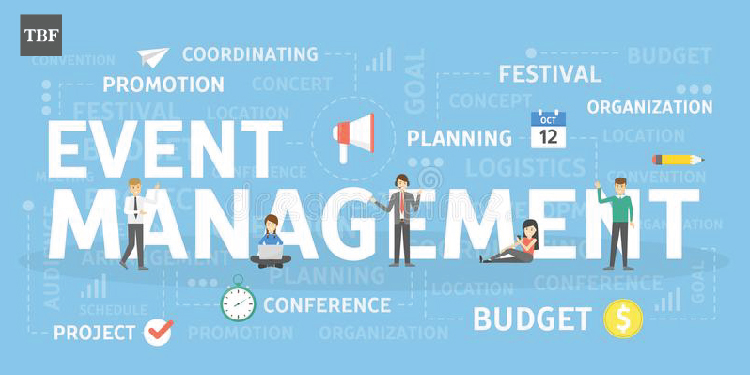How charlotte event companies turn visions into reality for every client
Wiki Article
Comprehending Everything About Event Management and Its Role in Successful Events
Event management is a crucial aspect in the execution of successful events. It entails careful planning and sychronisation to assure that every facet aligns with the designated vision. From business occasions to social events, the effectiveness of event management can substantially influence participant experience. However, understanding the subtleties of this area reveals more than just logistics. The details of communication, budgeting, and assessment play vital functions in shaping outcomes. What are the crucial elements that really drive success?The Value of Event Management
Event management plays an important role in guaranteeing the success of any kind of gathering, whether it be a business seminar, wedding, or event. It includes the planning, organization, and execution of events, which requires precise interest to detail and an organized technique. Successful occasion management aids develop remarkable experiences for attendees, fostering engagement and fulfillment.In addition, efficient event management can optimize source allocation, assuring that budget plans are abided by while optimizing the effect of the event. It includes coordinating various aspects such as venue selection, vendor management, and logistics, all of which add to a smooth experience.
In addition, efficient event management can minimize possible risks and difficulties, getting ready for unforeseen problems that may occur. By focusing on communication and collaboration among stakeholders, event managers can guarantee that objectives are fulfilled, causing successful end results and favorable feedback from individuals. Ultimately, the significance of event management depends on its capacity to transform visions into reality.
Trick Elements of Event Planning
In event planning, numerous essential components are crucial for success. Budget plan management techniques, venue selection tips, and timeline development essentials develop the foundation of a reliable plan. Each of these aspects plays a considerable role in ensuring that an event runs smoothly and satisfies its goals.
Budget Plan Management Approaches
Effective spending plan management is a foundation of effective event planning. It entails precise allotment of sources to assure that all facets of the occasion are sufficiently funded. A detailed budget plan must consist of groups such as location, food catering, amusement, advertising, and backup funds for unanticipated costs. To preserve monetary control, organizers need to track expenses carefully and regularly contrast them versus the spending plan. Using budgeting software can simplify this procedure, providing real-time updates on financial standing. Furthermore, acquiring numerous quotes from vendors can assist determine economical options without endangering top quality. By developing clear concerns and adhering to a well-structured budget plan, occasion supervisors can browse financial difficulties and improve the overall success of the event.Venue Selection Tips
Picking the right place is crucial for any kind of successful occasion, as it establishes the stage for the general experience. When choosing a place, occasion planners must consider elements such as area, ability, and ease of access. The location needs to be quickly obtainable for attendees, ideally located near transport options. In addition, the dimension has to suit the expected number of visitors easily, with room for any type of organized tasks. Coordinators should also assess the location's features, including audiovisual equipment, seating plans, and providing alternatives. Budget plan restraints play a significant function; as an outcome, understanding the overall costs, consisting of hidden charges, is important. Finally, checking out the place in advance allows for a direct analysis and assists assure it aligns with the occasion's vision and needs.Timeline Advancement Essentials
A well-structured timeline is important for effective event planning, functioning as a roadmap that overviews organizers via each stage of the process. Trick elements of timeline development consist of establishing due dates for each and every task, from initial concept to event execution. Organizers need to prioritize tasks, such as securing vendors, validating the place, and promoting the event. Regularly updating the timeline ensures that all stakeholders continue to be informed and liable. Additionally, incorporating buffer times for unanticipated hold-ups can help preserve total momentum. It is important to straighten the timeline with the event's objectives and sources, permitting efficient allotment of time and budget. Ultimately, a well-crafted timeline enhances coordination and cultivates an effective event experience for both planners and attendees.The Duty of Interaction in Events
Efficient interaction is important in event management, making sure that messaging is clear and constant. It promotes control amongst different stakeholders, which is essential for a smooth execution. Additionally, having robust crisis interaction techniques in place can greatly alleviate difficulties that may emerge during an occasion.Significance of Clear Messaging
Clear messaging functions as the backbone of effective event management, guaranteeing that all stakeholders-- participants, enrollers, and organizers-- are straightened in their expectations and understanding. Effective communication cultivates trust and openness, enabling clear purposes and preferred outcomes to be articulated. When messages are concise and regular, they minimize the risk of misunderstandings and misinterpretations, which can bring about functional inadequacies. Furthermore, clear messaging boosts attendee interaction, as participants are most likely to get in touch with an event when they understand its objective and relevance. In addition, it assists in advertising and marketing initiatives, allowing sponsors to acknowledge the value of their investment. charlotte event companies. Inevitably, clear messaging is vital for developing a cohesive experience that reverberates with all included, assisting in the total success of the eventControl Among Stakeholders
Effective event management depends heavily on seamless sychronisation among stakeholders, where communication plays an essential duty. Reliable interaction warranties that all events, consisting of suppliers, enrollers, and group participants, are lined up with the occasion's objectives and timelines. Routine updates and clear directives promote a joint atmosphere, decreasing misunderstandings and boosting performance. Stakeholders should establish open channels of communication, utilizing tools such as emails, conferences, and task management software program to track progression and address concerns quickly. Understanding each stakeholder's role and duties enhances liability, guaranteeing that tasks are carried out as intended. Eventually, well-coordinated interaction amongst stakeholders is necessary for navigating the complexities of occasion planning, causing a successful and remarkable event experience for all included.Efficient Situation Interaction Strategies
Just how can event managers guarantee that they are planned for unexpected challenges? Effective crisis communication methods are vital for taking care of unexpected scenarios during occasions. To start with, event supervisors ought you can look here to establish clear communication networks, making sure all stakeholders are notified quickly. Creating a situation communication strategy ahead of time enables for speedy action, outlining duties and duties. Additionally, training staff to react to situations makes certain that the group is equipped to take care of emergencies effectively.Making use of multiple interaction systems, such as social media, email, and public news, assists reach diverse target markets swiftly. Normal updates during a dilemma maintain openness and build trust amongst participants. Eventually, aggressive planning and clear interaction can greatly alleviate the negative influence of crises, resulting in effective occasion management, also in difficult conditions.
Budgeting and Financial Management
Budgeting and economic management are important parts of efficient occasion planning, as they regularly determine the total success of the event. A well-structured budget plan works as a roadmap, outlining awaited expenses and income streams. This economic blueprint aids event managers allot resources effectively and prevent overspending.Key aspects of budgeting include venue costs, wedding catering, enjoyment, advertising, and staffing. Each expenditure needs to be meticulously estimated and checked throughout the preparation process. Financial management additionally includes monitoring revenue sources, such as ticket why not look here sales and sponsorships, to guarantee monetary feasibility.
Routine financial evaluations permit occasion planners to change their methods as necessary, mitigating dangers connected with unanticipated costs. By keeping clear economic records, occasion supervisors can show accountability to stakeholders and enhance future preparation efforts. Eventually, effective budgeting and financial management prepared for delivering remarkable events while attaining business objectives.

Logistics and Operational Preparation
A well-structured budget plan prepares for efficient logistics and functional preparation in occasion management. It allows event planners to assign sources effectively, making sure that all logistical elements line up with the total vision. Secret parts consist of location selection, transport plans, and tools procurement. charlotte event companies. Organizers have to expect the needs of guests, vendors, and team, guaranteeing seamless control throughout the occasionOperational preparation additionally incorporates personnel tasks and training, ensuring all staff member understand their duties. Communication is critical; for that reason, developing clear networks among stakeholders decreases misunderstandings. Furthermore, contingency prepare for unanticipated situations, such as harsh weather condition or technological failures, are vital to keep smooth procedures.
Ultimately, the success of an event greatly depends on careful logistics and operational preparation. By focusing on these aspects, planners can produce unforgettable experiences while sticking to budget restraints and timelines, thereby achieving organizational goals.
Marketing and Promotion Strategies
While efficient logistics and operational preparation create the foundation of occasion management, successful advertising and promo strategies are important for bring in participants and making certain a high level of interaction. These strategies usually begin with determining the target audience, which enables event organizers to customize their messaging and choose proper interaction networks. Utilizing social networks platforms, email marketing, and collaborations with influencers can greatly intensify reach and presence.Moreover, creating compelling material such as videos, blog sites, and graphics can produce interest and excitement around the event. Early riser ticket deals and promotional price cuts also act as reliable rewards for potential attendees. Involving narration and clear here are the findings phone call to action are essential in transforming rate of interest into actual attendance. Additionally, leveraging analytics assists in examining the efficiency of advertising initiatives, making it possible for organizers to adjust strategies in real-time. Collectively, these aspects add to an effective event that resonates with its audience.
Evaluating Event Success and Feedback
Effective examination of event success and responses is crucial for continuous renovation and long-lasting development in occasion management. This process entails methodically collecting and evaluating data associated with various facets of an occasion, consisting of guest complete satisfaction, logistical implementation, and overall influence. Studies, meetings, and emphasis groups are usual techniques utilized to accumulate qualitative and measurable feedback from individuals.Secret performance signs (KPIs) such as participation numbers, profits generation, and social media interaction also play a crucial function in measuring success. By analyzing this info, occasion supervisors can recognize toughness to build on and weaknesses to resolve in future events.
Responses allows for changes to be made in real-time, enhancing the attendee experience and cultivating loyalty. Ultimately, a complete analysis process not only notifies future planning however also adds to a much more robust track record for the event management team, guaranteeing sustained success in an affordable landscape.

Frequently Asked Inquiries
What Qualifications Are Needed to End Up Being an Event Supervisor?
To come to be an occasion manager, people generally call for a mix of pertinent education and learning, such as a level in hospitality or service management, and practical experience in preparation, organizing, and carrying out different kinds of events successfully.Just how Do I Select the Right Place for My Event?
Choosing the best venue includes evaluating the occasion's purpose, ability, area, services, and spending plan. A complete evaluation guarantees that the place lines up with the occasion's objectives and boosts the total experience for participants.What Innovation Devices Are Necessary for Event Management?
Essential innovation tools for event management consist of enrollment software application, event applications, ticketing platforms, task management devices, and analytics software application. These sources streamline preparation, boost participant interaction, and promote interaction, eventually adding to a successful occasion experience.Exactly how Do I Deal With Unanticipated Issues During an Occasion?
To handle unanticipated problems during an event, one have to stay calm, examine the circumstance, connect properly with the group, apply pre-planned backup procedures, and adjust quickly to guarantee marginal disruption to the general experience.What Are the most recent Patterns in Event Management?
The most up to date trends in occasion management consist of virtual and hybrid formats, sustainability practices, individualized attendee experiences, enhanced usage of modern technology, and immersive environments. These fads aim to develop more interesting and memorable experiences for participants.Report this wiki page